|
|
|
Sort Order |
|
|
|
Items / Page
|
|
|
|
|
|
|
| Srl | Item |
| 1 |
ID:
147869
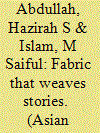

|
|
|
|
|
| Summary/Abstract |
This article examines the process of identity construction among the Iban indigenous people of Sarawak in Malaysia through pua kumbu – their sacred and ritual cloth. Although the Ibans are popularly known for their headhunting practices and longhouse dwellings, these cultural practices are in major decline and therefore pua kumbu is brought to the forefront as a significant means of identity construction. By illustrating the meanings, narratives, and ceremonies associated with pua kumbu, this article demonstrates that pua kumbu is not just a piece of sacred or ritual cloth; rather, it has significant meanings in the everyday life of the Ibans. It connects the Ibans with distinctly eternal meanings of their life and cosmology, past histories, and their connections to the physical environment. It thus helps the process of maintaining a boundary and identity construction of the Ibans by distinguishing between ‘us and them’ – the Ibans and others.
|
|
|
|
|
|
|
|
|
|
|
|
|
|
|
|
| 2 |
ID:
087711


|
|
|
|
|
| Publication |
2009.
|
| Summary/Abstract |
The paper aims to shed light on the conceptual link between international crises such as the one following September 11, 2001, and processes of identity construction through foreign policy. Crisis and identity construction are conceptualized as constant political phenomena. The political process is constituted by meaningful acts of social agents, and can thus only be grasped by analyzing meaning. Meaning is transmitted by language. Meaningful language is never reducible to individual speakers; it is a social act. The sum of articulatory practices in a social field is called discourse. Linking Critical Discourse Analysis (CDA) with the theory of hegemony developed by Ernesto Laclau and Chantal Mouffe, I will be able to show how hegemonic discourses serve as the nexus between the discursive construction of crises and identity change. A number of problems will be acknowledged when linking these two strands of thinking, as CDA and Laclauian theory work with tentatively different conceptions of discourse. The construction of the "war on terror" by the Bush administration between September 2001 and May 2003 is used as a case to illustrate the theoretical argument.
|
|
|
|
|
|
|
|
|
|
|
|
|
|
|
|
| 3 |
ID:
087731
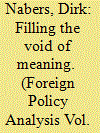

|
|
|
|
|
| Publication |
2009.
|
| Summary/Abstract |
The paper aims to shed light on the conceptual link between international crises such as the one following September 11, 2001, and processes of identity construction through foreign policy. Crisis and identity construction are conceptualized as constant political phenomena. The political process is constituted by meaningful acts of social agents, and can thus only be grasped by analyzing meaning. Meaning is transmitted by language. Meaningful language is never reducible to individual speakers; it is a social act. The sum of articulatory practices in a social field is called discourse. Linking Critical Discourse Analysis (CDA) with the theory of hegemony developed by Ernesto Laclau and Chantal Mouffe, I will be able to show how hegemonic discourses serve as the nexus between the discursive construction of crises and identity change. A number of problems will be acknowledged when linking these two strands of thinking, as CDA and Laclauian theory work with tentatively different conceptions of discourse. The construction of the "war on terror" by the Bush administration between September 2001 and May 2003 is used as a case to illustrate the theoretical argument.
|
|
|
|
|
|
|
|
|
|
|
|
|
|
|
|
| 4 |
ID:
139455


|
|
|
|
|
| Summary/Abstract |
Matters concerning Tibetan sovereignty, self-determination and political representation continue to be mired in intractable controversy as the People’s Republic of China and the Tibetan Government-in-Exile remain diametrically opposed on virtually all issues concerning Tibet’s political status, history and how it ought to be represented. Beyond these two dominant narratives, the relevant literature has paid scant attention to the other actors in this dispute, namely Tibetan people living throughout China. This article investigates identity constructions among Tibetan netizens in China through the use of forums, blogs and video postings. These flourishing new platforms for voicing and constructing alternative identity narratives provide a valuable and yet largely unexplored resource for examining how Tibetans in China construct self-representations in a time of increased interconnectivity, migration and cultural flux. By exploring the very lively and thriving participation of Tibetans in the Sino-blogosphere, this article showcases the highly diverse and creative processes of identity construction among Tibetan netizens based in China, and the myriad of ways in which Tibetans connect and disconnect online.
|
|
|
|
|
|
|
|
|
|
|
|
|
|
|
|
| 5 |
ID:
188383


|
|
|
|
|
| Summary/Abstract |
This article investigates the motivations driving the production of ISIS’s distinctive 2015 video, No Respite, released in response to the UN Security Council’s condemnation of the terrorist organization’s spate of violence. The article embraces a unique methodological framework that examines both the relationship between identity, discourse, and critical geopolitics and ISIS’s specific organized persuasive communication strategies. The framework is used to explain ISIS’s use of statistics as well as competitive and masculine discourse to bolster its legitimacy as a self-proclaimed state. The analysis is conducted through the lens of ISIS’s goal to be seen as a legitimate statehood project in lieu of a violent non-state actor.
|
|
|
|
|
|
|
|
|
|
|
|
|
|
|
|
| 6 |
ID:
147658
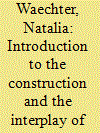

|
|
|
|
|
| Summary/Abstract |
This special issue challenges the concept of fluidity and flexibility of identities by demonstrating that ‘new’ European identity is not easily adopted and that the co-existence of ethnic and national identities is an ongoing process of negotiation. The theoretical approach assuming multiple identities can be confirmed for ethnic minorities in Central and Eastern Europe who were often thought to be focused on ethnic identities. This issue provides empirical quantitative and qualitative evidence for showing that ethnic minorities typically relate to their ethnic identity and to the national identity of their residence country simultaneously. The individual papers reveal that the development and maintenance of ethnic, national and European identities are often linked to the socio-economic situation and possible benefits. Also, social and cultural practices such as language and media consumption are crucial for the construction of identities. Furthermore, articles in the special issue highlight that national and European politics, above all minority rights and integration policies, may contribute to ethnic and European identification.
|
|
|
|
|
|
|
|
|
|
|
|
|
|
|
|
| 7 |
ID:
113887
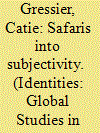

|
|
|
|
|
| Publication |
2011.
|
| Summary/Abstract |
The elite safari lodges in Botswana's Okavango Delta provide an intriguing site through which to explore processes of identity construction, as people from vastly different backgrounds meet and explore ontological possibilities through and against each other. Drawing on a dinner table dispute between an African American tourist and his white Motswana guide, I explore contested notions of what constitutes African identities. The encounter shows that colonial histories and the racialization of space continue to be central to African identity politics, and I describe how white citizens' claims to belonging are challenged on these grounds. In response to such challenges, white Batswana assert a strongly nationalistic identity, distancing themselves from other southern African white populations and their colonial histories. They staunchly defend their claims to belonging through mobilising a partial view of Botswana's history and contemporary sociopolitical conditions, which has made possible a deep sense of emplacement within the social and natural environments of the Okavango.
|
|
|
|
|
|
|
|
|
|
|
|
|
|
|
|
| 8 |
ID:
112397
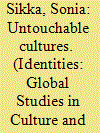

|
|
|
|
|
| Publication |
2012.
|
| Summary/Abstract |
In the context of the philosophical literature on multiculturalism, I argue in this article that models of cultural identity based entirely on the nonvoluntary possession of a set of cultural characteristics are seriously incomplete. In particular, such models cannot address the need, among some groups, to reconstruct, invent and imagine alternative positive identities as a result of historical injustice, and to fill in the content of 'culture' accordingly. As an illustrative case, I survey processes of identity construction among 'Dalits', members of former 'untouchable' and other lower caste communities in India, with a focus on the role of historical consciousness and existing power relations in the imagination of Dalit culture. Dalit strategies of identity negotiation reveal the understandable need, on the part of the members of this community in progress, to produce a cultural identity that makes sense, psychologically and politically, given who they cannot imagine themselves to be, due to the fact of historical oppression. My analysis does not merely target essentialism, nor is it meant to be deconstructive of identity claims. Rather, I highlight select elements within the negotiation of Dalit identity to illustrate (1) the relevance of real historical relations of discrimination and inequality to the construction of culture; (2) the equivocal character of 'choice' within this process; and (3) the emancipatory possibilities provided by imagined narratives of cultural selfhood.
|
|
|
|
|
|
|
|
|
|
|
|
|
|
|
|
|
|
|
|
|